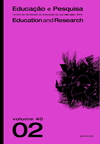Cognitive processes in initial reading: the relationship between word recognition strategies and literacy
DOI:
https://doi.org/10.1590/S1517-97022014005000006Abstract
The knowledge of grapheme-phoneme correspondences provides a mnemonic system which contributes to the training of beginning readers, favoring the development of reading fluency and comprehension. However, many children have difficulty in the process of automatic mapping of the writing and pronunciation of words and may need much more training to achieve a normal level of reading acquisition. This research has examined the strategies for recognizing written words expressed by children facing difficulties in literacy process in a reading test controlled by linguistic criteria related to the properties of words, such as the internal structure of syllables and the values of context-dependent and independent graphemes in the composition of words. From the characterization of the strategies used by the children, I sought to determine to what extent such strategies prevent the identification of the pronunciation and meaning of written words. It was concluded that children difficulties are related to strategies for reading words which demonstrate a dissociation between the knowledge of letters and the development of phonological awareness. It was also found that the delay in the learning process of students may be related to poor knowledge of the letter-sound correspondence rules and to the difficulty of the decoding mechanism in the analysis of non-canonical syllable structures.Downloads
Download data is not yet available.
Downloads
Published
2014-06-01
Issue
Section
Articles
License
Authors assume exclusive responsibility for the concepts expressed in their articles, which do not necessarily reflect the journal’s opinion.
Permission to photocopy all or part of the material published in the journal is granted provided that the original source of publication be assigned.
How to Cite
Cognitive processes in initial reading: the relationship between word recognition strategies and literacy . (2014). Educação E Pesquisa, 40(2), 449-466. https://doi.org/10.1590/S1517-97022014005000006



